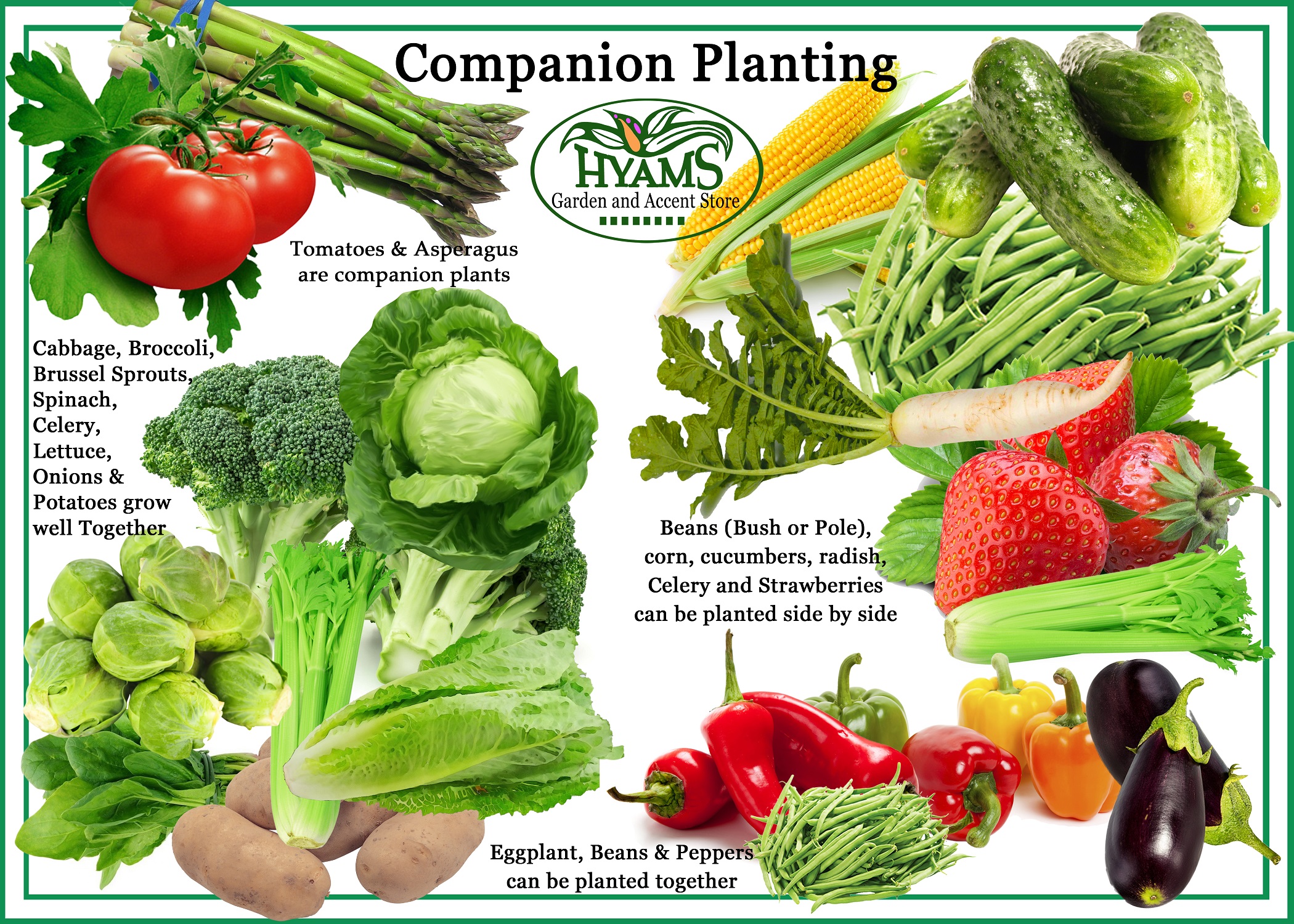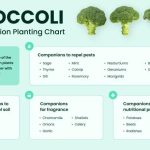Yes, carrots and broccoli can grow together. Carrots and broccoli are both nutritious vegetables, commonly grown in home gardens and commercially for consumption.
It’s important to know which plants can grow alongside each other for optimal growth and productivity. Gardeners may wonder if carrots and broccoli can grow together due to the individual requirements of the two vegetables. Both carrots and broccoli have extensive root systems, but broccoli requires more nitrogen than carrots.
While some plants may harm your broccoli harvest by using the same soil nutrients or by attracting pests, carrots and broccoli can grow happily together in the same garden bed. The proximity of these plants can even deter pests due to their companion planting benefits. Let’s explore more about these companion plants for an organic kitchen garden.
Can Carrots And Broccoli Grow Together?
Broccoli and carrots can grow together, but it’s important to consider their individual needs. Carrots need loose, well-draining soil, while broccoli prefers soil with plenty of organic matter. Additionally, it’s essential to ensure that broccoli doesn’t shade out the carrots, as they both require ample sunlight to thrive.
Carrots and broccoli can be grown together as companion plants. When planting these two vegetables together, it is important to consider the compatibility of other plants that may affect their growth. Some plants, such as tomatoes, eggplants, and peppers, should be avoided as they may negatively impact the broccoli harvest. Similarly, dill and fennel should be kept away from carrots, as they can stunt their growth and attract pests. On the other hand, planting chives, garlic, onions, leeks, or shallots near carrots can repel pests like aphids and carrot flies. Choosing the right companion plants can help promote healthy growth and protect your vegetables from pests. By following a companion planting guide, you can effectively grow a variety of vegetables in your garden.Companion Planting For Carrots And Broccoli
Carrots and broccoli can be grown together, with several companion plants available for both. While broccoli prefers soil that is lightly acidic, carrots require a neutral-to-slightly-sweet pH level. Gardeners can plant beets, chamomile, or calendula with both plants, while some plants such as nightshades should not be planted next to broccoli.
Companion planting is a common practice that involves pairing vegetable plants that benefit from each other’s nutrients, repel pests, or attract beneficial insects. Carrots have several companion plants that pair well with them, including chives, garlic, onions, leeks, and shallots. These plants repel pests like aphids and carrot flies with their potent scent. On the other hand, broccoli and Brussels sprouts thrive when planted alongside beets, buckwheat, calendula, carrots, chamomile, dill, hyssop, marigolds, mints, nasturtiums, onions, rosemary, sage, thyme, and wormwood. Marigolds, in particular, are known to repel cabbage moths. Avoid planting nightshades near broccoli, as they can affect the growth and yield of both plants. Also, keep dill, fennel, and parsnips away from carrots as they can stunt their growth and development.Carrots And Broccoli: Good And Bad Companion Plants
Carrots and broccoli can grow together, however, they are not the best companion plants. Carrots can stunt the growth of broccoli while broccoli attracts pests that can harm the carrots. It’s recommended to plant carrots with onions, leeks, or shallots instead.
Carrots and broccoli are good companion plants, but it’s important to know which other plants to grow alongside them. Marigolds and nasturtiums make great companion plants for broccoli, as they deter aphids and other pests that can damage the broccoli plants. When it comes to growing carrots, it’s best to use companion plants like chives, garlic, onions, leeks or shallots, as these plants have a strong scent that repels damaging pests like aphids and carrot flies. It’s also important to avoid planting certain plants alongside broccoli and carrots, such as nightshades for broccoli and dill, fennel, and parsnips for carrots. By following these tips, you can ensure that your carrots and broccoli grow together successfully.
Credit: www.epicgardening.com
What To Avoid Planting Next To Carrots And Broccoli
Carrots and broccoli can be planted together, but there are certain plants that should be avoided when planting next to them. For carrots, avoid planting dill, fennel, and parsnips. For broccoli, be wary of planting nightshades like tomatoes, eggplants, and peppers, which may affect the crop negatively.
It’s best to plant companion plants like garlic, onions, and leeks with carrots, while beets, chamomile, and marigolds work well with broccoli.
Avoid planting nightshade vegetables such as tomatoes, eggplants, and peppers next to broccoli as these plants tend to have a negative effect on broccoli growth and development. Moreover, avoid planting dill and parsnips near carrots as they can harm the growth of carrots. Fennel is also harmful to many plants, including carrots. On the other hand, planting chives, garlic, onions, leeks, or shallots next to carrots and leafy greens can help repel pests like aphids and carrot flies. It is also recommended to plant beets, buckwheat, calendula, chamomile, marigolds, mints, nasturtiums, onions, rosemary, sage, thyme, and wormwood near broccoli and Brussels sprouts. Meanwhile, keeping strawberries away from broccoli is important. Having a good understanding of companion planting will help you maximize the growth and yield of your vegetable garden.Preparing Your Soil For Growing Carrots And Broccoli
Carrots and broccoli can indeed grow together, but the soil must be prepared accordingly. To ensure optimal growth, it’s important to avoid planting certain vegetables such as tomatoes, eggplants, and peppers near broccoli, while planting chives, garlic, and onions next to carrots can help repel pests.
Proper soil preparation, including fertilizing and adding organic matter, is key to a successful harvest.

Credit: www.epicgardening.com
Tips For Growing And Harvesting Carrots And Broccoli
Carrots and broccoli are compatible plants that can grow together in the same garden bed. To ensure a successful harvest, plant them with compatible companion plants such as chives, garlic, onions, leeks, shallots, beets, calendula, carrots, chamomile, dill, hyssop, marigolds, mints, nasturtiums, onions, rosemary, sage, thyme, and wormwood.
Avoid planting nightshades, dill, fennel, and parsnips next to carrots or broccoli.
Carrots and broccoli can grow together in a garden with the right care and attention. When planting carrots and broccoli together, it is essential to ensure they have enough space to grow without overcrowding. Thinning out carrots is essential to give them the room they need, and planting them alongside onions, garlic, or chives can help repel pests like aphids. Broccoli is susceptible to cabbage worms and aphids, but planting it near herbs like chamomile, rosemary, or marigolds can help keep these pests at bay. Other plants to avoid planting near broccoli include nightshades like tomatoes and peppers. With proper attention and a bit of planning, growing carrots and broccoli together can be a successful and rewarding endeavor.
Credit: www.hyamsgardencenter.com
Frequently Asked Questions Of Can Carrots And Broccoli Grow Together?
What Should You Not Plant Next To Broccoli?
Broccoli should not be planted next to nightshade plants such as tomatoes, eggplants, and peppers. These plants may harm the broccoli harvest by attracting pests or using the same soil nutrients. It is best to avoid planting them alongside broccoli.
What Not To Plant Next To Carrots?
Avoid planting dill, fennel or parsnips near carrots, as they can harm their growth and attract pests. For best results, plant chives, garlic, onions, leeks or shallots next to carrots to repel pests. Tomatoes, eggplants and peppers may have an adverse effect on broccoli, so it’s best to avoid planting them alongside broccoli.
Brassicas, such as broccoli and Brussels sprouts, can help deter pests and provide shade for carrot plants.
What Grows Well With Carrots?
Carrots grow well with chives, garlic, onions, leeks, or shallots as they repel pests like aphids and carrot flies. However, it is best to avoid planting nightshades like tomatoes, eggplants, and peppers alongside broccoli as they may have an adverse effect on broccoli harvest.
Additionally, broccoli and Brussels sprouts can be planted near beets, buckwheat, calendula, carrots, chamomile, dill, hyssop, marigolds, mints, nasturtiums, onions, rosemary, sage, thyme, and wormwood.
What Vegetables Do Not Grow Together?
Certain vegetables should not be planted together as they may compete for soil nutrients or attract pests that can harm one another’s growth. Broccoli should not be planted next to nightshades such as tomatoes, eggplants, and peppers. Carrots should not be planted next to dill, fennel, and parsnips.
On the other hand, carrots grow well with chives, garlic, onions, leeks, or shallots. Companion plants for broccoli include beets, buckwheat, calendula, carrots, chamomile, dill, hyssop, marigolds, mints, nasturtiums, onions, rosemary, sage, thyme, and wormwood.
Conclusion
To sum up, growing carrots and broccoli together is possible, but it requires careful planning and consideration. While both plants have similar soil requirements, they may attract different pests and diseases, so it’s essential to choose compatible companion plants and avoid planting certain vegetables nearby.
Fortunately, there are many suitable options, such as chives, garlic, onions, leeks, or shallots, that can help repel pests and improve the overall health of your garden. By following these tips, you can create a thriving and diverse vegetable garden that will provide you with delicious and nutritious produce throughout the season.

I am a graduate of Bangladesh Agricultural University, where I delved into various agricultural disciplines, equipping me with a profound understanding of agriculture. Beyond academics, I have hands-on experience in gardening and crop cultivation. My passion is to embrace sustainable farming and horticulture. With a BSc in Agriculture, I am dedicated to promoting environmentally conscious and efficient agrarian practices.
Bachelor of Science (BSc) in Agriculture (Hons.)
Master of Science. (Sustainable Agriculture & Food Security ) (MS)
Bangladesh Agricultural University




